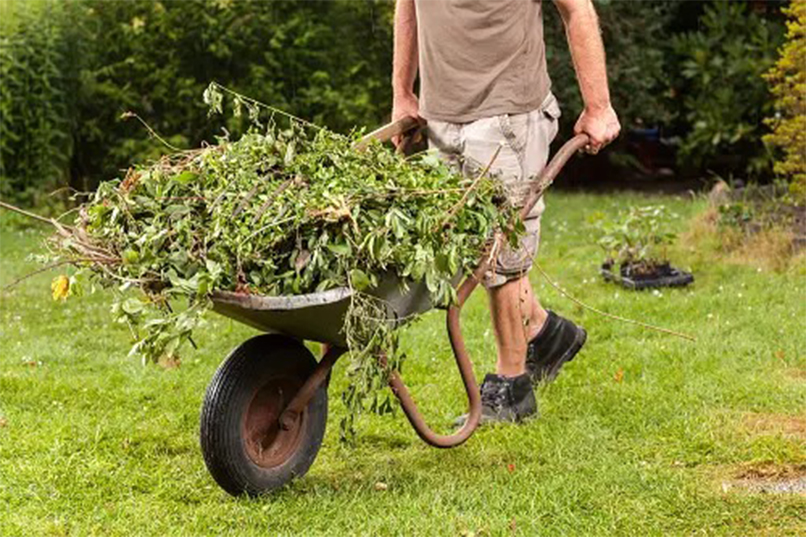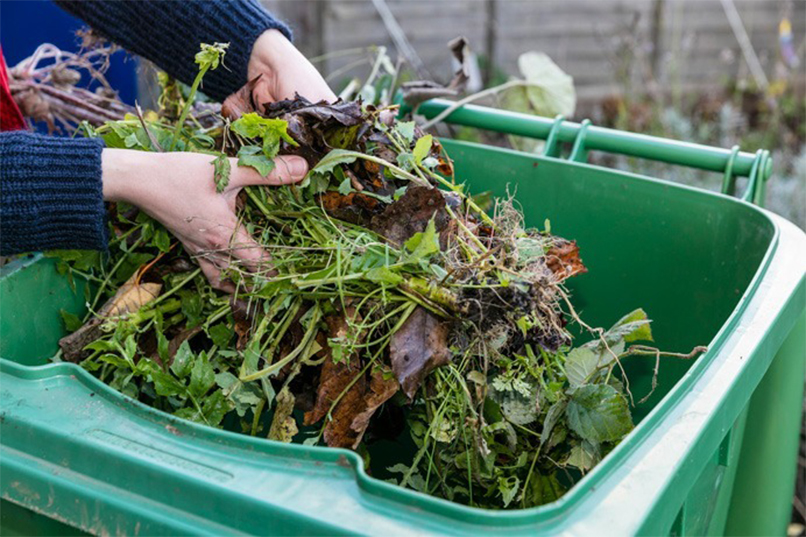Gardening is a popular activity that many people enjoy. Whether you’re growing fruits and vegetables, flowers, or herbs, maintaining a garden requires a lot of work, including pruning, trimming, and harvesting. As a result, garden waste can accumulate quickly, which raises the question of what to do with it. In this article, we will discuss various ways to deal with garden waste and turn it into something useful.
Composting
Composting is an excellent way to recycle garden waste and turn it into nutrient-rich soil. Composting is a natural process that involves breaking down organic matter, such as leaves, grass clippings, and food waste, into compost. Composting helps to reduce landfill waste, lowers carbon emissions, and improves soil quality. To start composting, you will need a compost bin or pile, water, and air. You can add green waste, such as grass clippings, and brown waste, such as leaves and twigs, to your compost pile. Mix the waste materials, keep the compost moist, and turn it regularly. Within a few months, you will have a rich, dark, and crumbly soil amendment that you can use in your garden beds.

Mulching
Mulching is another way to recycle garden waste and improve your soil’s quality. Mulching involves spreading organic materials, such as leaves, grass clippings, and wood chips, over your garden beds. Mulch helps to retain moisture, suppress weeds, and regulate soil temperature. Additionally, as the mulch decomposes, it releases nutrients into the soil, making it more fertile. To mulch your garden, spread a layer of organic material over your soil and around your plants. Make sure not to cover the plants’ stems or trunks, as this can cause rotting.
Recycling
If you have a large amount of garden waste and don’t have space to compost or mulch it, consider recycling it. Many local municipalities offer yard waste collection services, where you can dispose of your garden waste in a designated bin or bag. The collected waste is then taken to a composting facility or a biomass power plant, where it is converted into renewable energy.
Reuse
If you have tree branches or other large garden waste, consider reusing it in your garden. For example, you can use tree branches to create trellises, garden borders, or even a rustic garden bench. Large branches can also be cut into smaller pieces and used as kindling for your fireplace or outdoor fire pit.
Grasscycling
If you have a lawn, grasscycling is an excellent way to recycle your grass clippings and reduce your yard waste. Grasscycling involves leaving your grass clippings on your lawn instead of bagging and disposing of them. As the grass clippings decompose, they release valuable nutrients back into the soil, which can help reduce the need for fertilizers. Grasscycling can also help reduce water usage by improving your lawn’s ability to retain moisture.
Leaf Mold
Leaves are a common garden waste that can be turned into a valuable soil amendment called leaf mold. Leaf mold is created by allowing leaves to break down naturally over time, resulting in a rich, crumbly substance that can be added to your soil to improve its structure and fertility. To make leaf mold, collect fallen leaves and pile them in a corner of your yard or in a bin with plenty of air circulation. Wet the leaves occasionally to keep them moist, and turn the pile regularly to speed up the decomposition process. Within a year or two, you’ll have a rich, organic material that you can use to improve your garden soil.
Donating
If you have excess fruits or vegetables from your garden that you can’t consume or preserve, consider donating them to a local food bank or shelter. Many organizations accept fresh produce donations and distribute them to those in need.
Vermicomposting
Vermicomposting is a type of composting that uses worms to break down organic waste materials. This process results in a nutrient-rich soil amendment called vermicompost, which is similar to traditional compost but has higher levels of beneficial microorganisms. Vermicomposting is an excellent option for gardeners who have limited outdoor space or who want to compost indoors. To start vermicomposting, you will need a worm bin, bedding material, food scraps, and a healthy population of worms. Red wigglers are the most commonly used worms for vermicomposting. Feed your worms food scraps, like vegetable and fruit scraps, coffee grounds, and eggshells, and keep the bedding material moist. Over time, the worms will consume the food scraps and bedding material, producing vermicompost that you can use in your garden.

DIY Projects
Garden waste can be repurposed into a variety of DIY projects that can add charm and functionality to your garden. For example, you can use old flower pots or broken garden tools to create a unique garden sculpture. You can also turn branches into a natural trellis or fence, or use old pallets to build a raised garden bed. DIY projects are a great way to reuse materials that might otherwise end up in the landfill and create a personalized touch to your garden.
Hire a Professional
If you have a large amount of garden waste that you don’t have the time or resources to manage yourself, consider hiring a professional to handle it for you. Many landscaping and waste removal companies offer garden waste removal services that can take care of all your garden waste disposal needs.
Burning
Burning garden waste is a method that should only be used as a last resort. In some areas, burning garden waste is illegal, and it can also contribute to air pollution. However, in some situations where garden waste is excessive, it may be necessary to burn it. If you do need to burn garden waste, make sure to follow local regulations, and always use caution to avoid starting a fire.
Municipal Composting Programs
Many municipalities offer composting programs that allow residents to dispose of their yard waste in a responsible way. These programs may include curbside pickup or drop-off locations for garden waste. The collected yard waste is then processed into compost that is made available to residents for use in their gardens.
Biochar
Biochar is a soil amendment made from organic waste that has been burned at high temperatures in the absence of oxygen. This process produces a charcoal-like material that can be added to soil to improve its fertility and water-holding capacity. Biochar also helps sequester carbon, making it a valuable tool for mitigating climate change. You can make biochar yourself by burning garden waste in a specially designed kiln or purchase it from a supplier.
Mulch Mowing
Mulch mowing is a technique that involves using a specialized mower to cut grass into small pieces that can be left on the lawn as a natural mulch. Mulch mowing not only reduces yard waste, but it also helps conserve water and improve soil health. The grass clippings left behind by mulch mowing decompose quickly, adding valuable nutrients back into the soil.
In conclusion, there are many ways to manage garden waste, from composting and mulching to recycling and repurposing. When deciding on the best method for your garden waste, consider the resources you have available and the benefits each method provides. With a little bit of effort, you can turn your garden waste into a valuable resource that can benefit both your garden and the environment.



